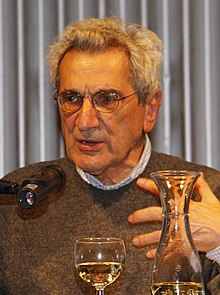
Back Antonio Negri Afrikaans أنطونيو نيجري Arabic انطونيو نيجرى ARZ Antonio Neqri Azerbaijani Антонио Негри Bulgarian Antonio Negri Catalan Antonio Negri Czech Antonio Negri Danish Antonio Negri German Αντόνιο Νέγκρι Greek
Antonio Negri | |
|---|---|
 Negri in 2009 | |
| Born | 1 August 1933 Padua, Kingdom of Italy |
| Died | 16 December 2023 (aged 90) Paris, France |
| Alma mater | |
| Era | Contemporary philosophy |
| Region | Western philosophy |
| School | |
| Institutions | |
Main interests | |
Notable ideas |
|
| Part of a series about |
| Imperialism studies |
|---|
 |
| Part of a series on |
| Libertarian socialism |
|---|
 |
Antonio Negri (1 August 1933 – 16 December 2023) was an Italian political philosopher known as one of the most prominent theorists of autonomism, as well as for his co-authorship of Empire with Michael Hardt. Born in Padua, Italy, Negri became a professor of political philosophy at the University of Padua, where he taught state and constitutional theory.[4] Negri founded the Potere Operaio (Worker Power) group in 1969 and was a leading member of Autonomia Operaia, and published hugely influential books urging "revolutionary consciousness."
Negri was accused in the late 1970s of various charges including being the mastermind of the left-wing urban guerrilla organization Red Brigades (Brigate Rosse or BR),[5] which was involved in the May 1978 kidnapping and murder of former Italian prime minister Aldo Moro. On 7 April 1979, Negri was arrested and charged with a long list of crimes including the Moro murder. Most charges were dropped quickly, but in 1984 he was still sentenced (in absentia) to 30 years in prison. He was given an additional four years on the charge of being "morally responsible" for the violence of political activists in the 1960s and 1970s.[6] The question of Negri's complicity with left-wing extremism is a controversial subject.[7] He was indicted on a number of charges, including "association and insurrection against the state" (a charge which was later dropped), and sentenced for involvement in two murders.
Negri fled to France where, protected by the Mitterrand doctrine, he taught at the Paris VIII (Vincennes) and the Collège international de philosophie, along with Jacques Derrida, Michel Foucault, and Gilles Deleuze. In 1997, after a plea-bargain that reduced his prison time from 30 to 13 years,[8] he returned to Italy to serve the end of his sentence. Many of his most influential books were published while he was behind bars. He hence lived in Venice and Paris with his partner, the French philosopher Judith Revel. He was the father of film director Anna Negri.
- ^ a b c Maggiori Robert, "Toni Negri, le retour du «diable» Archived 5 January 2016 at the Wayback Machine", Libération.fr, 3 July 1997.
- ^ Antonio Negri and Michael Hardt, Empire (Cambridge, Massachusetts & London, England: Harvard University Press, 2000), § 3.4.
- ^ Elsa Romeo, La Scuola di Croce: testimonianze sull'Istituto italiano per gli studi storici, Il Mulino, 1992, p. 309.
- ^ Cite error: The named reference
:0was invoked but never defined (see the help page). - ^ Cite error: The named reference
portelliwas invoked but never defined (see the help page). - ^ Oxford Reference. "Antonio Negri". Archived from the original on 5 April 2017.
- ^ Drake, Richard. "The Red and the Black: Terrorism in Contemporary Italy", International Political Science Review, Vol. 5, No. 3, Political Crises (1984), pp. 279–298. Quote: "The debate over Toni Negri's complicity in left-wing extremism has already resulted in the publication of several thick polemical volumes, as well as a huge number of op-ed pieces."
- ^ Windschuttle, Keith. "Tutorials in Terrorism", The Australian, 16 March 2005. [dead link]
© MMXXIII Rich X Search. We shall prevail. All rights reserved. Rich X Search